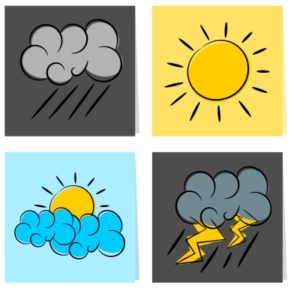
If you live in North or South Carolina, you know the recent weather has been influencing our lives in a major way. In Chinese Medicine terms, weather has a strong effect on our physiology as well. Whether it’s a passing system or the general climate, the air out there will affect a number of bodily functions. Here’s how that works and what you can do about it:
Rain: Rain is considered damp or an excess pathological fluid in Traditional Chinese Medicine (TCM). Bi syndrome, TCM’s version of arthritis, is often triggered by damp weather conditions. This means, your joints may swell and ache more in rainy weather. Other signs of excess damp in the body include post-nasal drip, bloating and extra weight. To counter dampness, avoid raw foods and icy beverages. The Chinese medical diet discourages raw foods and cold drinks in general. For anyone with pain, this recommendation is even more important. Soups, stews, hot teas and warming spices such as ginger, cumin, clove, ginger and cinnamon work to dispel damp.
Cold: Cold often is a dual factor in damp pain conditions, but cold can exist without swelling. Cold contracts blood flow. This means that an area with scar tissue, a previous injury or any compromised circulation will feel more painful in cold weather. Massage enhances blood flow and brings warmth to the painful area. This doesn’t have to be a fancy massage at a spa. You can easily rub medicated oil into your own limbs/joints. If you want to make your own massage oil, excellent essential oils for cold and pain include ginger, frankincense, vetiver, tumeric, rosemary and clove. Avoid essential oils with cooling qualities such as lavender and peppermint. Always test for allergies with essential oils before use. Pain-relieving base oils include apricot seed, sesame seed and safflower. Again, avoid base oils with a cooling nature such as coconut. You can make your oil by adding 12 total drops essential oil per one ounce base oil. Moderate exercise is also a great way to counter cold pain.
Wind: Wind disrupts the surface of the body, where your immunity shields you from pathogens, in the TCM view. This means that at the surface or pore level, a force called Wei Qi circulates to protect you. A cold or flu in TCM terms is called wind strike or cold damage. This means that a pathogen or virus enters your body via wind through open pores. Bells Palsy, common in areas where people ride scooters or bicycles for transportation, takes advantage of wind to enter the pores, freezing the surface as cold contracts the area. To protect yourself in cold and windy weather wear a scarf to protect the neck and upper back, areas especially vulnerable to wind. Avoid staying in windy areas after sweating as pores must open to release sweat, leaving your body vulnerable. Stimulate your wei qi with therapeutic exercise such as qi gong or tai chi. Dry skin brushing is an excellent way to not only stimulate wei qi, but also activate lymph nodes and immune cells.
Heat/Dryness: Hot, dry climates pose challenges to our body’s fluids. If you’ve ever been in Southern California during a Santa Ana — or hot desert wind — you’ll feel the constant thirst associated with dryness. Hot, dry climates can parch the skin, saliva and mucous membranes. To reduce fluid depletion, avoid spicy foods as these reduce fluids. Coffee and smoking also aggravate dryness. Although exercise is always encouraged, excessive exercise causing copious sweating creates dryness. Foods that benefit fluids include eggs, almonds, sesame seeds and pears. If the climate is hot, electrolyte replacement can be helpful. Try a sugar-free electrolyte powder such as Ultima if you’re exercising or working in a hot climate.
Aside from weather, some people constitutionally lean toward dampness or dryness. If your eyes and skin are frequently dry with no external cause, you will benefit from leaning more toward moistening foods. If your body is prone to feeling heavy and achy with swelling then you’ll benefit from the above recommendations regarding damp regardless of the weather. Seeing an acupuncturist means you’ll get a personalized assessment of where you fall on the spectrum, with an acupuncture treatment and herbal prescription to help your body heal from external or internal influences.